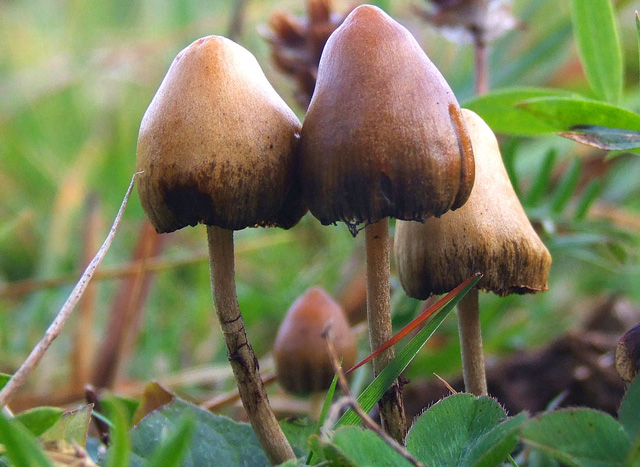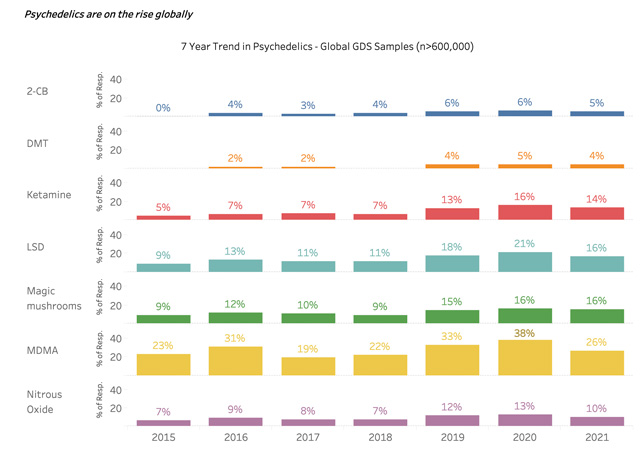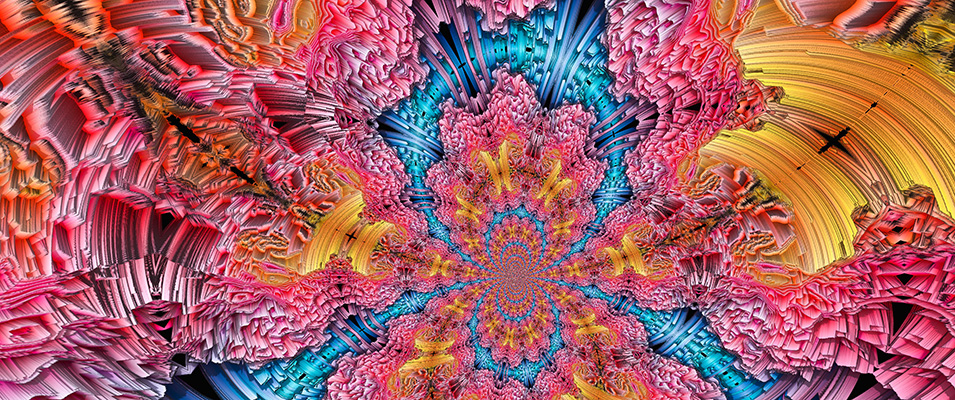By Giulia Gionta
Psychedelics are experiencing a renaissance in the psychiatric and mental health community worldwide. For decades psychedelic research was discouraged by the U.S. government. However, the need to find faster-acting and longer-lasting treatments has become more urgent as record numbers of people are suffering with depression, anxiety, and other mood and mental disorders.
Prior to the onset of the COVID-19 pandemic in 2020, depression and anxiety were already the leading causes of disability worldwide. Brian Hildago, 36, a life-long resident of Massachusetts, was on antidepressants for over 10 years, “I’ve been on several different SSRI meds and they never gave me true relief from depression,” says Hildago. “I stayed on them for as long as I did because it was at least something. Also, it was one of the only ‘solutions’ ever recommended to me.”

Hallucinogenic mushroom Psilocybe semilanceata
Selective serotonin reuptake inhibitors, or SSRIs, are a widely used type of antidepressant that work by increasing levels of serotonin in the brain, which has influence upon mood, but also with cognition, sleeping, eating, thermoregulation, memory, and even physiological processes like vomiting.
“While there is no good research for why SSRIs are not effective or why they lose their effectiveness, it is highly likely it may be due to constantly changing stressors and factors in the brain,” says Paul Nestadt, M.D., psychiatrist and co-director of the Jack and Mary McGlasson Anxiety Disorders Clinic at Johns Hopkins.
In 2016, Johns Hopkins Medicine researchers first reported that treatment with psilocybin under psychologically supported conditions significantly relieved existential anxiety and depression in people with a life-threatening cancer diagnosis.
Now, the findings from a new study, published on November 4 in JAMA Psychiatry, suggest that psilocybin may be effective in the much wider population of patients who suffer from major depression than previously thought. Psychedelics are known to primarily affect serotonin.
The published findings cover only a four-week follow-up in 24 participants, all of whom underwent two five-hour psilocybin sessions under the direction of the researchers.
“The magnitude of the effect we saw was about four times larger than what clinical trials have shown for traditional antidepressants on the market,” says Alan Davis, Ph.D., adjunct assistant professor of psychiatry and behavioral sciences at the Johns Hopkins University School of Medicine. “Because most other depression treatments take weeks or months to work and may have undesirable effects, this could be a game changer if these findings hold up in future ‘gold-standard’ placebo-controlled clinical trials.”
Catalyzed by early reports on the unique potency and remarkable subjective effects of lysergic acid diethylamide (LSD) in the early 1950s, psychedelics, and particularly LSD, became widely used by psychologists and psychiatrists in research and clinical practice, with tens of thousands of patients estimated to have been treated with ‘psychedelic psychotherapy’ over a period of about 15 years.
“Since serotonin is so widely important in the body, there are molecular regions called serotonin 2A receptors located throughout the central nervous system,” says Isabella Grabski, Ph.D. student in Biostatistics at Harvard University. “Chemicals can bind to these receptors in order to stimulate or block the serotonin system. Although this mechanism is not fully understood, these receptors are believed to be the targets of psychedelics. Some studies have even found psychedelics to increase neuroplasticity, which leads to the creation of more connections between neurons and could potentially explain the novelty of the intense psychological experiences.”
Microdosing involves regularly taking small doses of psychedelics, like psilocybin, over a period of weeks or months. It is theorized to work in the same fashion, albeit to a milder degree.
The Global Drug Survey 2020 found more people are turning to psychedelics to self-treat mental illness and emotional distress, with LSD, MDMA and psilocybin being most common.

The Global Drug Survey 2021 uses data from over 32,000 people from over 20 countries.
In the United States, possession of psilocybin-containing mushrooms is illegal because they contain the Schedule I drugs psilocin and psilocybin. The legalization and decriminalization of psilocybin and other psychedelics vary from state to state, but in New York currently, psilocybin has not been decriminalized nor legalized.
Brian Hildago describes his journey of self-healing through microdosing psilocybin. “Going from SSRI medication to psilocybin felt like a light switch was flipped on, turning night into day,” says Hildago. “I came off of SSRI meds and then a few days later began microdosing. I felt positive affects immediately.”
In addition to treating mood disorders like depression and anxiety, psilocybin is proving effective at treating cluster headaches and migraines, addiction, and ADHD.
Jamie Reynolds, 30, resident of Michigan, microdoses psilocybin to treat chronic depression and ADHD, executive disfunction. “My ADHD symptoms caused a lot of stress in my home and microdosing has helped me learn new ways of doing things that actually work,” says Reynolds. “The difference was noticeable immediately and the effects seem to multiply. My depression is in remission and I no longer take any SSRI medications.”
New 2021 Yale research found that the compounds of psilocybin and ketamine can increase the density of dendritic spines, small protrusions found on nerve cells which aid in the transmission of information between neurons. Chronic stress and depression are known to reduce the number of these neuronal connections.
Alex Kwan, associate professor of psychiatry and neuroscience at Yale says, “It may be the novel psychological effects of psilocybin itself that spurs the growth of neuronal connections. These new connections may be the structural changes the brain uses to store new experiences.”
As clinical trials and research is ongoing, evidence of the effectiveness of psilocybin through self-healing is growing rapidly and with positive results. And as cities across the U.S. introduce legislature to decriminalize and legalize psychedelics such as psilocybin, some believe long-awaited healing is on the horizon for many in the mental health community.




